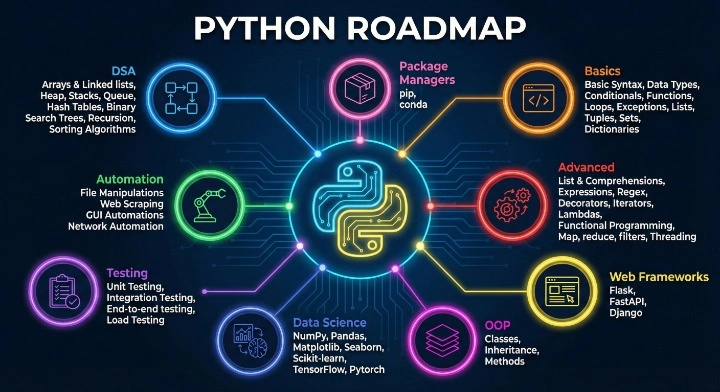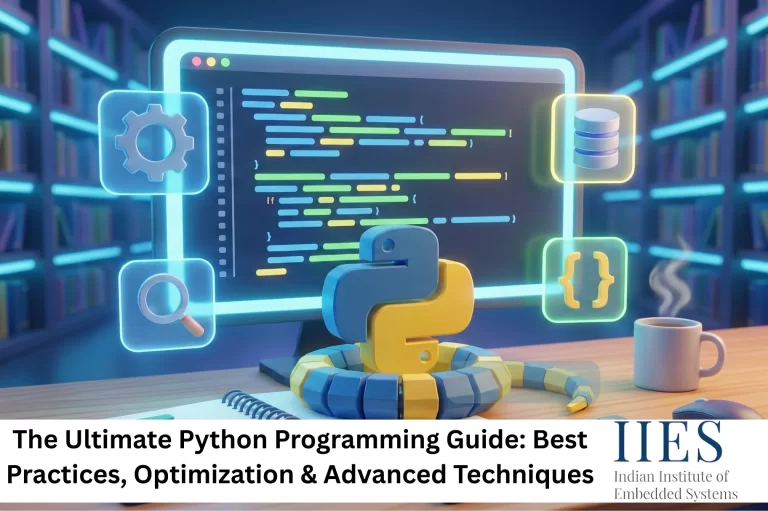Why Python Continues to Grow Globally
Python’s adoption continues to expand because it combines simplicity with power. Its ecosystem supports rapid development while remaining flexible enough for enterprise-scale systems.
Key reasons behind its growth include:
- Clean, readable syntax that accelerates development
- A strong open-source community
- A massive and mature library ecosystem
- Multi-domain use cases including AI, Machine Learning, web development, IoT, automation, and cybersecurity
- Cross-platform compatibility
Professional development today requires more than writing working scripts. It demands discipline, performance awareness, and alignment with established Python coding standards.

Writing Clean Code with Python Coding Standards
Code readability directly affects collaboration efficiency, debugging time, and maintainability. Following recognized Python coding standards ensures consistency across projects and teams.
Core formatting principles include:
| Element | Recommended Practice | Benefit |
| Indentation | 4 spaces | Clear logical structure |
| Naming | snake_case for variables/functions | Improves readability |
| Classes | PascalCase | Industry convention |
| Constants | UPPER_CASE | Easy identification |
| Imports | Grouped and organized | Cleaner architecture |
Readable, structured code reduces technical debt and aligns with professional Python best practices used in production environments.
Before diving deeper into optimization and advanced concepts, let’s look at the complete Python development roadmap to understand how different skills connect across levels
 This roadmap shows how Python progresses from basics and data structures to web frameworks, testing, automation, and data science. Each stage builds on the previous one
This roadmap shows how Python progresses from basics and data structures to web frameworks, testing, automation, and data science. Each stage builds on the previous one
How to Make Python Code More Efficient
Understanding how to make Python code more efficient requires balancing readability with measurable performance improvements. Optimization should solve real bottlenecks rather than introduce unnecessary complexity.
Using built-in functions is one of the simplest and most effective performance improvements:
numbers = [5, 2, 8, 1]
sorted_numbers = sorted(numbers)
total = sum(numbers)
Built-in functions are implemented in optimized C code, making them faster and more reliable than manually written loops.
List comprehensions improve both speed and clarity:
squares = [x * x for x in range(10)]
Compared to traditional loops, list comprehensions are typically faster and more concise.
Generators significantly improve memory efficiency:
def generate_numbers():
for i in range(1000000):
yield i
Unlike lists, generators do not store all elements in memory at once. This approach is essential when processing large datasets or streaming pipelines.
Choosing the correct data structure also impacts performance:
items = {1, 2, 3, 4}
if 3 in items:
print("Found")Sets provide faster membership testing compared to lists, making them ideal for validation checks.
These decisions form the foundation of practical Python code optimization techniques.
Advanced Python Techniques for Scalable Architecture
Moving beyond intermediate coding requires mastering advanced Python techniques that improve modularity and maintainability.
Decorators enable reusable behavior extension:
def logger(func):
def wrapper(*args, **kwargs):
print("Executing function")
return func(*args, **kwargs)
return wrapperContext managers ensure safe resource handling:
with open("data.txt", "r") as file: content = file.read()
Unpacking improves clarity
: a, b, c = (10, 20, 30)<>
Lambda functions simplify small transformations:
double = lambda x: x * 2
These techniques improve modular design and reinforce structured Python best practices.

Python Exception Handling Best Practices
Reliable systems anticipate and manage failure gracefully. Following structured Python exception handling best practices improves resilience and maintainability.
Catching specific exceptions prevents hidden bugs:
try:
result = 10 / 0
except ZeroDivisionError:
print("Cannot divide by zero")Using finally ensures cleanup actions:
try:
file = open("example.txt")
finally:
file.close()Creating custom exceptions improves clarity in large systems:
class InvalidInputError(Exception):
pass
Well-designed error handling improves debugging clarity and system stability.
Python Dependency Management Tools for Stable Projects
As projects grow, managing packages correctly becomes essential. Reliable Python dependency management tools prevent version conflicts and ensure consistent deployments.
| Tool | Purpose |
| pip | Package installation |
| venv | Isolated environments |
| pipenv | Integrated dependency management |
| poetry | Modern packaging and version control |
Best practices include:
- Always using virtual environments
- Freezing dependency versions in requirements.txt
- Avoiding global installations
- Documenting setup steps clearly
Controlled dependency management ensures reproducible builds across development and production environments.
Real-World Mini Project Example
Consider a log analysis tool designed to process multi-gigabyte server logs in a production environment.
The initial implementation relied on standard lists and nested loops. While functional, it resulted in slow execution times and high memory consumption when handling large log files. This is a common issue when scalability is not considered during development.
After applying advanced Python techniques and structured Python code optimization techniques, the performance improved significantly.
The optimization process included:
• Streaming files using generators instead of loading entire files into memory
• Using sets for fast membership testing and unique record tracking
• Leveraging dictionaries for efficient counting
• Implementing structured Python exception handling best practices
• Managing environments using Python dependency management tools
Mini Practical Workflow: Optimized Log Analyzer
Project Goal: Efficiently analyze large server logs (2GB+ files)
Workflow Approach:
• Stream file line-by-line using generator-based iteration
• Extract IP addresses using lightweight parsing
• Store unique IPs in a set for O(1) lookups
• Count occurrences using dictionaries
• Handle malformed lines using targeted exception handling
• Freeze project dependencies using a requirements file
This structured workflow directly improves scalability and maintainability while reducing runtime overhead.
Optimized Code Example
This example demonstrates:
• Memory-efficient iteration
• Fast lookup using optimized data structures
• Clean and readable structure aligned with Python coding standards
• Practical implementation of Python exception handling best practices
Performance Optimization Comparison
Understanding trade-offs helps developers make informed decisions:
| Technique | Performance Gain | Memory Impact |
| Generators vs Lists | High | Major savings |
| Built-in Functions | High | Neutral |
| Proper Data Structures | Very High | Neutral |
| Avoid Deep Nesting | Moderate | Neutral |
These comparisons highlight practical optimization decisions rather than theoretical improvements.
Emerging Trends in Python Development
Modern Python development continues evolving. Key areas of growth include:
- Artificial Intelligence and Machine Learning integration
- Asynchronous programming using asyncio
- Type hinting for improved static analysis
- Python in IoT and embedded systems
- Performance acceleration through C extensions
Staying aware of these trends strengthens long-term career growth and technical adaptability.
Continuous Learning Strategy
Mastery in Python requires consistent experimentation and hands-on application. Building tools, contributing to open-source projects, and reviewing high-quality repositories improve both technical depth and architectural thinking.
Combining structured Python best practices, performance optimization, modular architecture, and disciplined dependency management results in scalable, professional-grade applications.

Conclusion
This comprehensive Python programming guide covered structured coding standards, practical methods for how to make Python code more efficient, scalable advanced Python techniques, disciplined Python exception handling best practices, reliable Python dependency management tools, and measurable Python code optimization techniques.
Python’s real strength lies not just in its simplicity but in how thoughtfully it is used. Writing clean, efficient, and well-structured code ensures maintainability, performance stability, and long-term professional growth.
Consistent practice, architectural discipline, and real-world implementation remain the foundation of mastering Python in today’s competitive software ecosystem.






